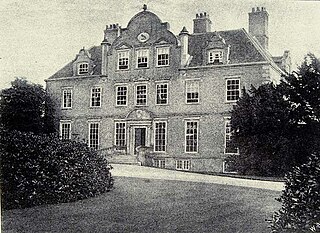
Baron St Levan, of St Michael's Mount in the County of Cornwall, is a title in the Peerage of the United Kingdom. It was created on 4 July 1887 for the former Member of Parliament Sir John St Aubyn, 2nd Baronet, becoming John St Aubyn, 1st Baron St Levan. He had previously represented Cornwall West in House of Commons as a Liberal and St Ives as a Liberal Unionist. He was succeeded by his eldest son, the second Baron, who was a Colonel and Honorary Brigadier-General in the Grenadier Guards. On his death the titles passed to his nephew, the third Baron, the son of the Hon. Sir Arthur James Dudley Stuart St Aubyn (1867–1897), second son of the first Baron. The third baron was succeeded in 1978 by his eldest son, the fourth baron, who had served with the Royal Navy at Dunkirk and in a minesweeper in Arctic Convoys during World War II and was awarded the Distinguished Service Cross (DSC). As of 2014, the titles are held by the fourth Baron's nephew, the fifth Baron, who succeeded in 2013.

Sir Uvedale Price, 1st Baronet, author of the Essay on the Picturesque, As Compared with the Sublime and The Beautiful (1794), was a Herefordshire landowner who was at the heart of the 'Picturesque debate' of the 1790s.
There have been three baronetcies created for members of the Anstruther family, two in the Baronetage of Nova Scotia and one in the Baronetage of Great Britain. Two of the creations are extant while one is extinct.
There have been two baronetcies created for persons with the surname Colquhoun ("Cohoon"), one in the Baronetage of Nova Scotia (1625) and one in the Baronetage of Great Britain (1786).

John Hope, 2nd Earl of Hopetoun was a Scottish aristocrat.
There have been two baronetcies created for persons with the surname Steel, both in the Baronetage of the United Kingdom.
Uvedale Tomkins Price, of Poston Lodge and Foxley, Yazor, Herefordshire, was a British Tory and later Whig politician who sat in the House of Commons between 1713 and 1734.

Sir Robert Price, 2nd Baronet was a British baronet and Member of Parliament.

The Levinge Baronetcy, of High Park in the County of Westmeath, is a title in the Baronetage of Ireland. It was created on 26 October 1704 for Richard Levinge, Speaker of the Irish House of Commons and Lord Chief Justice of the Irish Court of Common Pleas. The seventh Baronet sat as Liberal Member of Parliament for Westmeath from 1857 to 1865.

Sir Archibald Macdonald, 1st Baronet was a Scottish-born English lawyer, judge and politician.

Sir Harry Verney, 2nd Baronet PC, DL, JP was an English soldier and Liberal politician who sat in the House of Commons variously between 1832 and 1885.
Sir Charles Whitworth was a British politician who sat in the House of Commons for 31 years from 1747 to 1778. He was known for his expertise in statistics and finance.
John Fleming was a British surgeon of the Indian Medical Service, naturalist, and politician. While in India he served as an interim superintendent of the Royal Botanic Garden, Calcutta before William Roxburgh took charge. He was the Member of Parliament (MP) for Gatton 1818–1820, Saltash 1820–1826. Fleming was an amateur botanist and a Fellow of the Royal Society of London, Royal Society of Edinburgh and the Linnean Society.
Uvedale is a given name and a surname. Notable people with the name include:
Sir Richard Corbet, 2nd Baronet, FRS, was an English politician who sat in the House of Commons from 1677 to 1683.

Sir Godfrey Webster, 4th Baronet was an English politician. He used the additional surname Vassall in the period 1795 to 1797.

Sir Robert Bradshaigh, 3rd Baronet (1675–1747), of Haigh Hall near Wigan, was an English landowner and Tory politician who sat in the English House of Commons and British House of Commons for 52 years from 1695 to 1747.

Sir Richard Corbet, 4th Baronet (1696–1774), of Longnor, Shropshire, was a British Whig politician who sat in the House of Commons for 24 years between 1723 and 1754.

Robert Price (1717–1761) was an English gentleman, known as an artist for his drawings, and as a musical amateur. He contributed to the garden design at the family property of Foxley, Herefordshire, was an art patron, and was the father of Uvedale Price, theorist of the picturesque.

Foxley is a rural estate, and the former Foxley Manor country seat, in Herefordshire, England. The Manor is associated with the judicial, political, artistic and later ennobled Price family, and became the site of the Second World War Foxley Camp.












